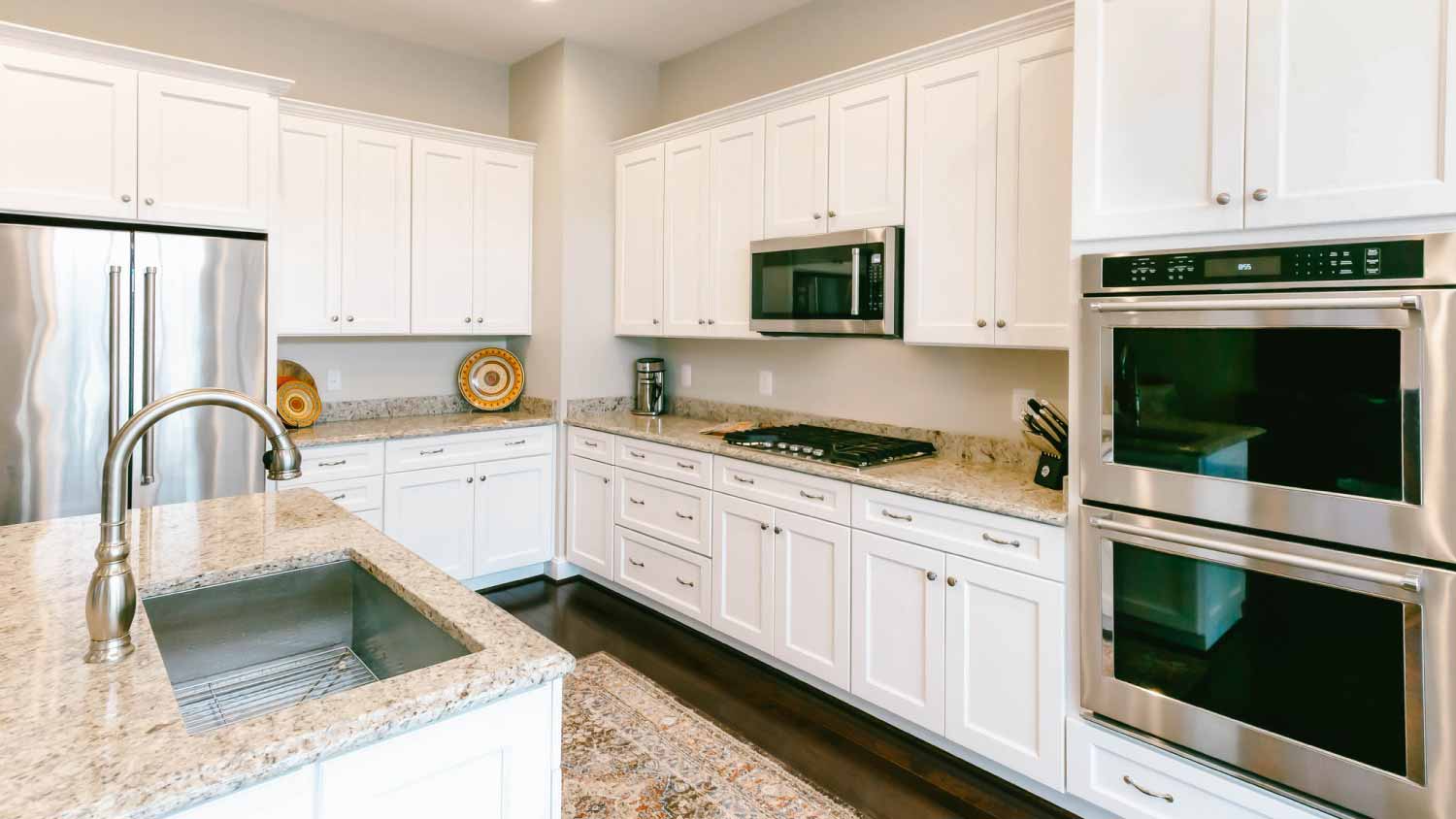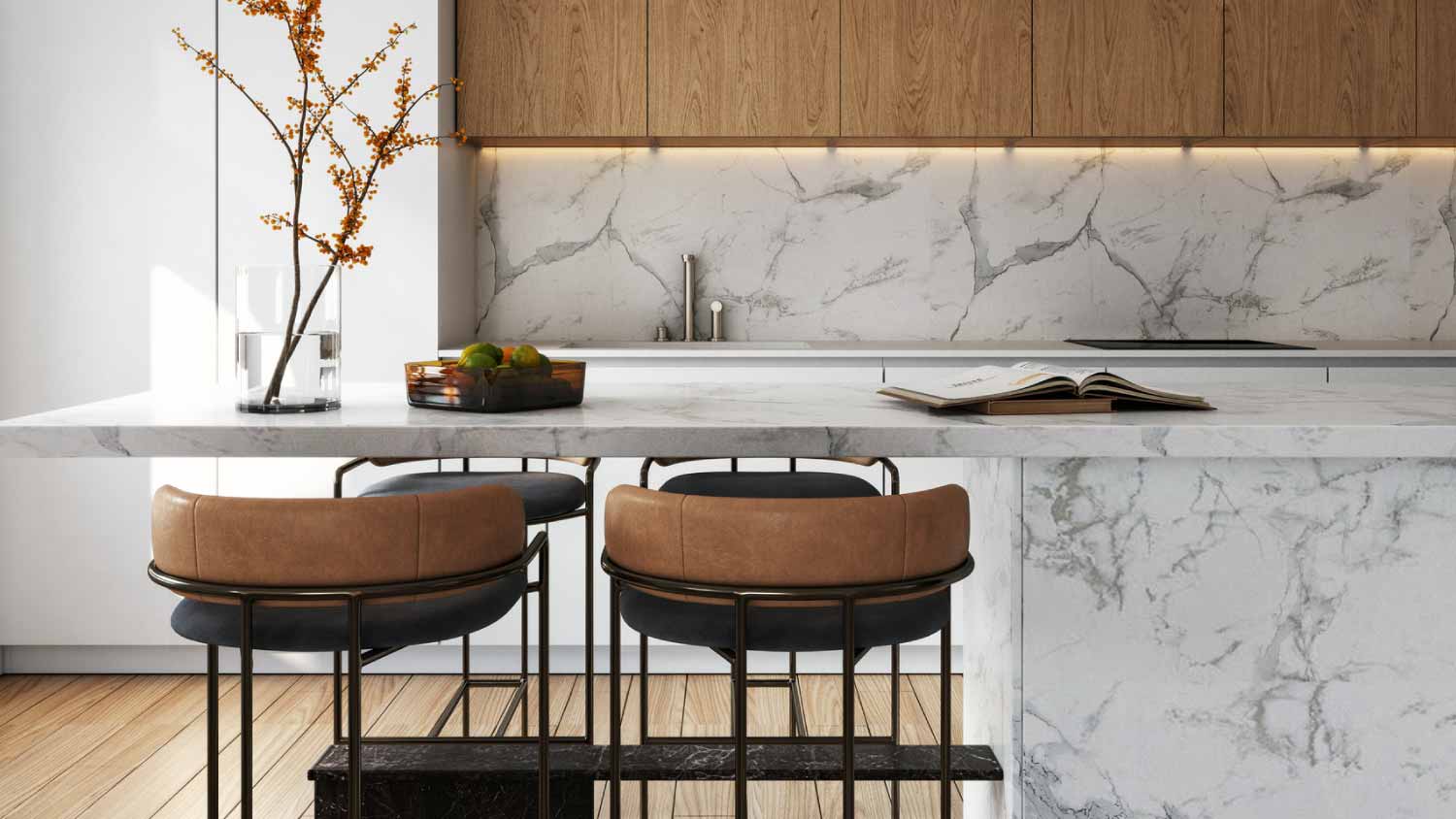
Butcher block countertops are a popular and durable choice for active kitchens. Learn how much it costs to install butcher block counters and what factors may affect pricing.
Learn more before splurging on this stylish stone


Granite countertops originate from naturally occurring igneous rock.
They’re durable, heat-resistant, and have a unique, luxurious-looking appearance.
Granite countertops require regular resealing, and you should let pros handle installation and repairs.
This material is more expensive than most other countertops, costing an average of $3,250.
Few areas of your home endure more wear than your kitchen and bathroom surfaces. Daily exposure to heat, moisture, and bacteria means the countertop material you select must be sturdy as well as stylish. Granite might be synonymous with luxury and longevity, but it has drawbacks. Learn more about the pros and cons of granite countertops to help you decide if this natural stone surface is right for your remodel.

Granite countertops come from igneous rock mined in large slabs directly from quarries. The hard, granular rock forms when magma or lava cools and crystallizes. Granite contains quartz, feldspar, and smaller amounts of other minerals. The natural stone slabs are cut and polished to produce a workable, even countertop.
Granite’s durability, ready availability, and unique colors and patternation have made it a popular material for countertops for over 100 years.
| Pros | Cons |
|---|---|
| Heat resistant | High cost |
| Unique appearance | Challenging to install |
| Durable | Requires resealing |
| Easy to clean | Often requires pro repair |
| Good ROI | Not customizable |

There’s lots to love about these luxury surfaces.
Given how it forms, it’s no surprise that granite countertops are naturally heat-resistant. You don’t have to worry about cracks appearing after accidentally laying down a scorching pan on the bare surface.
If you’re not a fan of off-the-shelf kitchens, granite countertops will appeal. The stone's naturally occurring imperfections produce one-of-a-kind color tones, speckles, and veining.
With the right maintenance, ultra-durable granite countertops can last a lifetime. Although the material isn’t unbreakable, it is highly chip- and scratch-resistant.
Cleaning granite countertops is a cinch, provided you regularly reseal them. A wipe-down with dish soap and warm water is all it takes. Avoid harsh acidic chemicals or abrasive cleaners, which can damage the surface and cause discoloration.
Quality granite countertops are an attractive selling point for potential house buyers. Installing them is an upgrade that adds value to your home—an impressive 70% average return on investment.

It’s not all smooth sailing with these surfaces.
This premium material costs significantly more than laminate or porcelain tiles. While it might not be the most budget-friendly countertop option, its longevity makes it a savvy investment. You can also save by purchasing small- to medium-sized leftover granite remnants for smaller surfaces rather than a larger solid slab.
Granite countertops are heavy, bulky, and tricky to transport. Cracks from poor handling or cutting can be costly. Installing granite countertops should be done by professionals with the tools and skills to maneuver the large slabs safely, cut granite edges, and, where necessary, reinforce cabinets below the heavy countertops.
Granite is a porous surface, so it requires regular maintenance to stay in top shape. Annually resealing your granite countertops helps keep unsightly stains, moisture, and bad bacteria from setting up shop on your countertop.
Because granite countertops are so durable, repairs are rare. However, scratches and cracks are possible, especially if you drop a heavy pot onto the vulnerable surface corners or edges. Patching up the problem yourself isn’t easy, but a countertop repair pro near you can use a specialized epoxy resin to cover up minor damage deftly. You can't always repair major cracks and chips, resulting in expensive replacement.
While its durable longevity is one of the biggest benefits of granite countertops, it isn’t a customizable countertop surface. You cannot paint or stain it when you fancy a change, as you can with wood or concrete.
Still unsure if granite surfaces are right for your remodel? Here are some other popular countertop material types.
Butcher block: Wood countertops are cost-effective and easy to repair, but this porous material needs regular maintenance to extend its life span—and watch out for scorch marks.
Concrete: On-trend, heat resistant, and highly customizable, but it comes at a cost, and without the right maintenance, concrete can be prone to damage and stains.
Laminate: Stain-resistant, inexpensive, and low-maintenance, but this material is vulnerable to heat, and it has one of the shortest countertop life spans.
Limestone: Comparing limestone to granite, it’s more cost-effective but not as tough or scratch-resistant.
Marble: This durable stone might be the height of luxury with stunning veining, but it is prone to staining and scratches and doesn’t come cheap.
Porcelain: An easy-to-install, budget-friendly, customizable option. However, these tiles are tricky to clean, prone to cracks, and the grout can harbor bacteria.
Quartz: Even more durable than granite, quartz countertops combine natural stone with resins and pigments to create a nonporous surface. Consequently, when comparing quartz to granite, the former comes with a higher price tag.
The average cost of granite countertops is $3,250. However, you could pay anywhere from $500 to $9,000, depending on the quality of the granite, the size of your countertops, and whether you do the installation yourself. Even the granite's color, texture, and finish can influence the price.
Installing granite tile countertops or sectional pieces might be within reach if you are an experienced DIYer, and it can save $35 to $85 per hour on labor. However, unless you have specialist equipment, you need a professional to measure and cut your countertop pieces.
If you aren’t a dab-hand DIYer or are dealing with large slabs of granite to form a seamless work surface, you must hire a professional countertop installer to complete the job. If you drop the heavy slab, fit it incorrectly, or even grout or seal your granite countertop poorly, it can lead to costly repairs or premature countertop replacement.
Going for granite makes sense if you’re looking for a naturally beautiful, one-of-a-kind countertop that will last a lifetime. The material's heat resistance and durability are also handy if you have careless kids who might accidentally cause damage. Consider other options when you’re on a tight budget, not a fan of maintenance work, or want the option to change the color in a decade or so.
Hire a countertop contractor near you to complete the project to guarantee a seamless installation process.
From average costs to expert advice, get all the answers you need to get your job done.

Butcher block countertops are a popular and durable choice for active kitchens. Learn how much it costs to install butcher block counters and what factors may affect pricing.

Countertop repair costs may be the deciding factor between replacing or repairing your counter. Let’s break down the cost to repair, resurface, or relaminate.

The cost of stainless steel countertops may seem shocking compared to laminate, but their durability may be worth it. Here’s how much you can expect to spend.

Learn about the pros and cons of Dekton countertops to decide if this highly durable material is best for your indoor or outdoor kitchen.

Concrete countertops need sealing to protect them from stains and burns. Learn how to seal concrete countertops to keep your kitchen looking good for longer.

Depending on the type of damage, you can repair a laminate countertop yourself—here are some tips to help restore your countertop.